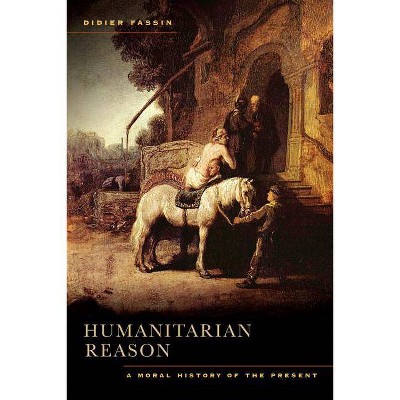Writing the World of Policing - by Didier Fassin (Paperback)

$32.00 when purchased online
Target Online store #3991
About this item
Highlights
- As policing has recently become a major topic of public debate, it was also a growing area of ethnographic research.
- About the Author: Didier Fassin is the James D. Wolfensohn Professor of Social Science at the Institute for Advanced Study in Princeton and Director of Studies at the Ecole des Hautes Etudes en Sciences Sociales in Paris.
- 320 Pages
- Social Science, Research
Description
About the Book
In his edited collection Writing the World of Policing: The Difference Ethnography Makes, renowned anthropologist-sociologist Didier Fassin brings together some of the greatest minds in the social sciences to reflect on the question of urban policing in disadvantaged neighborhoods worldwide. The aim of the volume is both to show how ethnography can illuminate the role of policing in society as well as to show how an attention to law enforcement can alter and provoke the practice of ethnography itself. Spanning five continents and tackling such concepts as accountability, complicity, morality, detention, alibi, and others, this volume is bound to become one of the major statements on a topic of increasing interest. Structured around three sections--position, observation, and description--the book mirrors the process of the ethnographic method itself, taking us deep within each local context it investigates while never losing sight of the global relevance of crime, law, and the exercise of power inherent to both.Book Synopsis
As policing has recently become a major topic of public debate, it was also a growing area of ethnographic research. Writing the World of Policing brings together an international roster of scholars who have conducted fieldwork studies of law enforcement in disadvantaged urban neighborhoods on five continents. How, they ask, can ethnography illuminate the role of the police in society? Are there important aspects of policing that are not captured through interviews and statistics? And how can the study of law enforcement shed light on the practice of ethnography? What might studying policing teach us about the epistemological and ethical challenges of participant observation? Beyond these questions of crucial interest for criminology and, more generally, the social sciences, Writing the World of Policing provides a timely discussion of one of the most problematic institutions in contemporary society.Review Quotes
"Writing the World of Policing reinvents and returns ethnographic scholarship to the curiously neglected themes of the policing of poor neighborhoods, underprivileged populations, and marginalized minorities. With narrative verve, this carefully edited volume provides an empirically grounded account of just how the police everywhere shape and are shaped by the strikingly comparable work they do."-- "John Van Maanen, author of Tales of the Field"
"Fassin has asked some of the world's best ethnographers of policing to reflect on the ethical, political and practical complexities of describing this unstable, if indispensable, heart of modern statecraft. The result is a unique collection of personal and reflexive essays, theoretically astute and global in scope, while deeply attentive to how the ethnographer co-produces the situation under analysis. This volume is not only timely and important at this historical juncture, it is also a contribution of lasting value that will inspire students and aspiring ethnographers and seasoned fieldworkers from all disciplines."-- "Thomas Blom Hansen, Stanford University"
"Policing is an important topic in criminal justice research, discussion, and debate. In this edited collection's 12 chapters, scholars from across the globe explore the institution of policing. The authors discuss policing in South Africa, India, Taiwan, Mozambique, Turkey, Chile, Bolivia, Thailand, Portugal, France, and the US. As the field of criminology has matured, the use of quantitative methods to analyze social phenomena has become widespread. This book breaks from the trend by taking an ethnographic approach to examining police and policing. The contributing authors specifically examine topics such as discretion, violence, and training. . . . This informative, well-written book will be a valued addition to university library collections seeking to support anthropology, sociology, or criminology and criminal justice programs. It could serve as a resource for research or as assigned reading for graduate seminars concerning policing or qualitative research methods in criminology and criminal justice. Highly recommended."-- "CHOICE"
"Writing about the world of policing makes a difference, and Fassin and his colleagues show how in this welcome volume. This collection of superb original papers, organized around themes like 'position', 'observation', and 'description', is prefaced by Fassin's masterful reflections on 'writing up'. A classic in the making, this is an assessment of an emergent field and a vision for future research."-- "Peter K. Manning, Northeastern University"
About the Author
Didier Fassin is the James D. Wolfensohn Professor of Social Science at the Institute for Advanced Study in Princeton and Director of Studies at the Ecole des Hautes Etudes en Sciences Sociales in Paris.Dimensions (Overall): 8.9 Inches (H) x 5.9 Inches (W) x .7 Inches (D)
Weight: .95 Pounds
Suggested Age: 22 Years and Up
Number of Pages: 320
Genre: Social Science
Sub-Genre: Research
Publisher: University of Chicago Press
Format: Paperback
Author: Didier Fassin
Language: English
Street Date: October 25, 2017
TCIN: 1006094417
UPC: 9780226497648
Item Number (DPCI): 247-36-3936
Origin: Made in the USA or Imported
Shipping details
Estimated ship dimensions: 0.7 inches length x 5.9 inches width x 8.9 inches height
Estimated ship weight: 0.95 pounds
We regret that this item cannot be shipped to PO Boxes.
This item cannot be shipped to the following locations: American Samoa (see also separate entry under AS), Guam (see also separate entry under GU), Northern Mariana Islands, Puerto Rico (see also separate entry under PR), United States Minor Outlying Islands, Virgin Islands, U.S., APO/FPO
Return details
This item can be returned to any Target store or Target.com.
This item must be returned within 90 days of the date it was purchased in store, shipped, delivered by a Shipt shopper, or made ready for pickup.
See the return policy for complete information.











